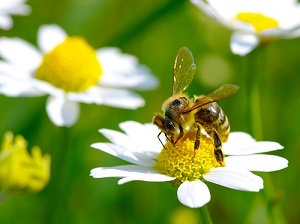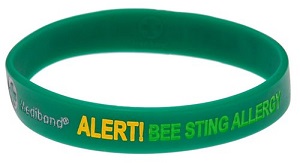For some it's simply a nuisance and hazard of working outdoors, for others it literally puts them in a life or death situation.

Often overlooked, injuries and deaths due to bees, spiders, and other insects are a concern that companies should manage as seriously as any other hazard in the workplace. Fatal on-the-job injuries do occur as a result of bites and stings from insects and spiders, with the majority of these deaths from bee stings.
If employees are working outdoors or in any area where ants, insects, bees, wasps, ticks or spiders could be present, it would be a good idea to have an annual safety meeting on insects, bees & spiders. Topics should include how to recognize and avoid potential areas where insects may be lurking, what clothing is best to wear in the working environment, reminders to keep work areas clean and basic first aid tips if any employee is bitten or stung.
OSHA Standard 1926.21(b)(4) says that in job site areas where harmful plants or animals are present, employees who may be exposed shall be instructed regarding the potential hazards, and how to avoid injury, and the first aid procedures to be used in the event of injury.

When it comes to injuries and deaths due to insects, bee stings cause the most damage because many people are allergic to them, so one sting or many could prove fatal. If bees or wasps could be a threat in the work environment, emphasize these points during the safety meeting.
- Inspect your work area before starting for signs of bees or wasps.
- Wear light-colored, smooth-finished clothing to cover as much of the body as possible.
- Keep work areas clean. Insects may be attracted to discarded food or open drink containers.
- When a bee stings, its stinger, the venom sac and other parts of the bee's body are pulled out and left behind, killing the bee.
- Bee stingers should be removed as soon as possible since the venom sac remains attached with the bee flies off and can continue injecting venom.
- A wasp retains its stinger and it can sting many times. Wasp stings also carry a small amount of venom that may cause irritation and infection.
- Seek immediately medical attention if an insect bite or sting causes severe chest pain, nausea, severe sweating, loss of breath, serious swelling, or slurred speech.
- The venom from bees and ants can be extremely toxic to some people and even prove fatal.
- If workers are aware that they have a severe allergy to biting or stinging insects, they should consider using a medical warning bracelet or necklace or carry a wallet card.
- Workers with a history of sever allergic reactions to insect bites or stings should carry an epinephrine auto-injector and consider warning their co-workers before starting work for the day.

.jpg)

.jpg)